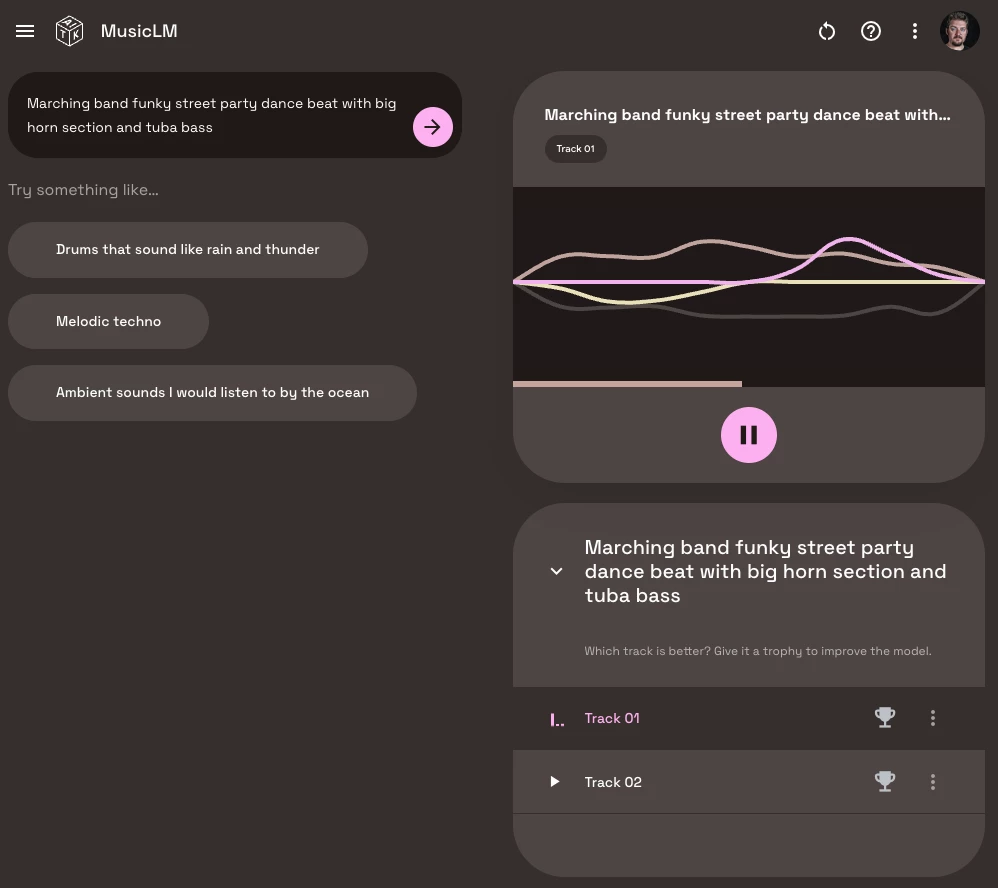Deep learning neural nets have begun a roughshod rampage through the creative arts sectors, and if musicians thought they were safe from the AIs that plague the nightmares of writers, artists and others, they've got another think coming.
We've seen a number of creative AI music projects over the last seven or so years, but MusicLM still managed to drop our jaws when the paper and demo website were released earlier this year.
Here was an AI that could take a simple text prompt and apparently turn it into a fully orchestrated, mixed and recorded piece of music, complete with nonsense vocals. An otherworldly soundtrack composer you could simply tell where you needed certain feelings to rise and fall in your timeline. A machine into which you could upload the most atonal hummed melody, and have it whip up what the idea would sound like fully executed by a salsa band, a group of Gregorian monks, a punk band, a dubstep DJ or a shamisen player.
The demo was jaw-dropping. As an erstwhile video editor and producer, I was immediately struck by how powerful this machine could be for soundtracking. As a musician, I was both shot through the heart and inspired by its potential for generating ideas.
Now, Google has opened MusicLM up to the public as part of its AI Test Kitchen, and I've been playing with it all afternoon. And I'm a lot less impressed now than I was with the original demo.

It's clear that Google has locked a lot of this thing down, presumably because it's worried about copyright issues. As with ChatGPT, it's a plagiarist at heart. It's digested millions of hours of music somebody else created, along with descriptions, and when it "creates" music it's more or less guessing what it thinks is likely to come next.
The difference is that while this can be difficult to spot in a chunk of AI-created text, it's crystal-clear when you hear a piece of music. Your ear can pick Billie Jean in seconds, over a crappy stereo system in a noisy cafe, just from the drum beat. When MusicLM assembles its tokens into a song, fragments catch your ear in the same way, hinting at where it came from.
Google won't let you name an artist in your queries, and the new demo locks out vocals. But if you ask it for "compton gangsta rap with attitude," or "paisley park purple funk," for example, you'll hear some very familiar sounds, with enough fragments of vocal reverb left in the mix that you can pinpoint the artist, and sometimes the song, the AI has cribbed a particular moment from.
That's a fun game. But the system as presented for public use is simply nowhere near as good as the demo tracks are. Indeed, a lot of the time it ignores key parts of text prompts entirely, leaving out instruments you've specifically requested, or merrily writing away in 4/4 even if you've requested 7/8.
And while the general mood is often reminiscent of what you're looking for, a lot of the music just makes no sense. The odd guitar lick might land in key with the rest of what's going on, but much of it is complete nonsense, ideas that begin and go nowhere. Rhythmic grooves are established, and then often skip, or tumble into random mayhem that sounds like your grandad manually tuning his car radio. There's a hint of a catchy melody, but it falls away and you never hear it again.
Now, this is clearly an early stage system that'll get a lot better with alarming speed if the rest of the AI scene is any indication – and it's also clearly been hobbled in the name of not getting sued. But as presented to the public, this thing ain't ready for prime time.
That doesn't mean it's not useful, though. Ironically enough, I reckon this thing is a brilliant groove sample generator. It can't seem to make something that stays consistent for very long, but there are flashes of brilliance that are genuinely inspiring. And since you can download whatever it makes, a producer type could quickly assemble a huge slate of interesting loops to build songs on top of – provided you're willing to deal with the low-fi, mono samples you'd be getting out of it.
Heck, even if you took a MusicLM groove idea and rebuilt it from the ground up, maybe you'd have an idea you wouldn't have had otherwise – and in music, sometimes that's pure gold.
It's certainly fascinating stuff – and this opinion may well be horribly out of date by next week, when for all I know MusicLM will get its first Grammy nomination. Take a look at YouTuber Mike Russell playing around with it, or go have a play yourself!
Source: Google AI Test Kitchen





